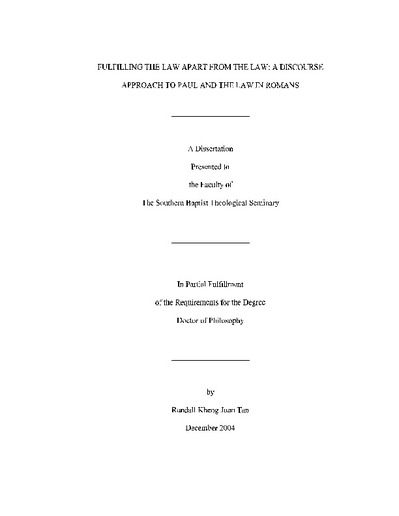Fulfilling the law apart from the law: A discourse approach to Paul and the law in Romans
Subject
Paul, the Apostle, Saint--Contributions in theology of lawBible. N.T. Romans--Criticism, interpretation, etc.
Jewish law--Biblical teaching
Law (Theology)--Biblical teaching
Abstract
This dissertation represents a prolegomena to a new approach to the study of the Greek New Testament, with ½ó¼o[varsigma] in Romans as a test case. Chapter 1 introduces the seemingly intractable interpretive debates concerning the Mosaic Law.
Chapter 2 outlines an integrative model of understanding language--systemic-functional linguistics (SFL)--that forms the foundation of this study and the central pillar for the application of that theory--corpus linguistics using the annotation database of Opentext.org project.
Chapter 3 develops a number of tools on the basis of SFL and corpus linguistics as supporting pillars for text analysis. Specifically, it provides a map on what to study in a text and how to do it.
Chapter 4 illustrates the methods developed in chapter 3 and introduces the reader to the discourse of Romans through the Opening (Rom 1:1-7) and Thanksgiving (Rom 1:8-17) sections. Ultimately, a more comprehensive study building upon this initial attempt at a bottom-up analysis will be needed for a full discourse commentary on Romans.
Chapter 5 explores the portrait of ½ó¼o[varsigma] from the angle of patterns of lexical repetition. Different passages on ½ó¼o[varsigma] are shown to be mutually interpretive.
Chapters 6 and 7 examines the functional patterns of ½ó¼o[varsigma] as the head term of a word group (without a genitive qualifier) and as a modifier respectively. The common meaning component and reference patterns for ½ó¼o[varsigma] are uncovered in the process.
Chapter 8 investigates the patterns of ½ó¼o[varsigma] as modified by a genitive. It was discovered that ½ó¼o[varsigma] has different reference patterns when modified. Chapter 9 is the overall summary.
This work contends that while ½ó¼o[varsigma] most often refers to the Mosaic Law, the more general reference usage of the word as an entity that prescribes standards and as a controlling principle (in Romans 7-8) shed light on the meaning and function of the Mosaic Law and on the theme of control in Romans.

